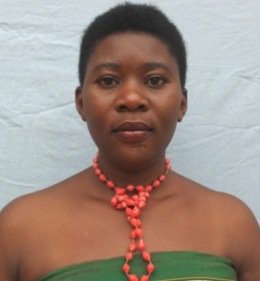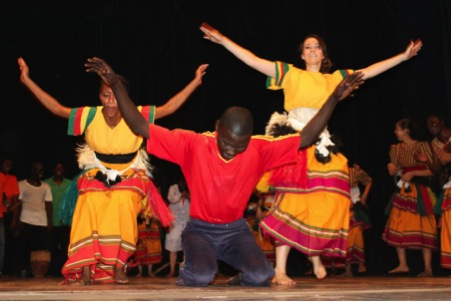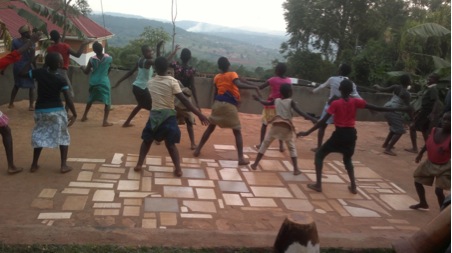Tereka Kenneth Desire, Performing Artist
Godwin Mindrea Buwa and Mulombamungu Aloys II, Musicians
D Mc Viniikizo, Musician, Dancer, Community Youth Activist, and Social Entrepreneur
Sylvia Namulema Kigula
Performing Artist
Sylvia Namulema Kigula is a performing artist, performing arts teacher, and operations director at Naggalabi Indigenous Theatre (NIT), which is located in Nsangi su county Wakiso district, Uganda. She is also starting a creative and performing arts department at Ndejje University that will launch in 2015.
Uganda issues of repression for current-day artists in Ugandan reach back to the first days of their independence in 1962 from 68-years of British colonial rule. With the changing regimes, Ugandans expected absolute freedom, total independence, and full protection. It turned out however, that many of these expectations were unfulfilled. Such feelings fed artists and playwrights with good material to create their work. Artists wrote on betrayed hopes, political disintegration, power struggle among leaders, which sometimes resulted in killing of rivals and exploitation of masses. Artists tackled topics on struggle and resistance reflecting people’s determination to resist bad governance, which led to oppression of almost every artist. The government believed (and still do) that artists will incite riots and recruit rebels that will try to take over the government. Authorities labeled artists as “inciters of violence” and “possible rebels”. Not all government officials comply with these ideas and are tired of the injustices and oppression. They recognize the power of artists to connect with society, hiring them to compose art to disseminate information on health issues, sanitation, population policy, national identity cards, and demand that the end of embezzling public funds.
Prominent Ugandan playwrights and artists like John Ruganda, Robert Sserumaga, Nuwa Ssentongo, Alex Mukulu, Byron Kawadwa, Fagil Monday, Lubwa-P`chong, and Charles Ssenkubuge among others, some of whom are dead, were forced into exile. Others were imprisoned thus crippling their families and performing arts career. As a result, performing artists such as Sylvia repress their expressions on stage that reveal their dissatisfaction and unhappiness of life in Uganda. And while art, according to Sylvia, is a perfect agent of change because it opens ones eyes to what is happening to society, for an artist to express the realities would bring great risk. Her art does not express concerns regarding health, illiteracy, corrupt government, political instability, inequality, climate change, love, and family. Instead, Sylvia diverts the focus in her art from reality to humor. Her objective is to lighten up the audience and give them an escape from what is happening in their present conditions.
Sylvia describes an underground art production in Uganda that depicts the true picture of Uganda. The musician Ronald Mayinja from Golden Band sang about Uganda’s corruption—every dirty trick done by government officials. The song is titled “Ani agula ensi kuba tugitunda?”, which means, “Who is buying Uganda because we are selling it”. After the release of the song, the authorities summoned Mayinja and banned the song. In reaction, underground sales for the song were huge.
Sylvia and the Naggalabi Indigenous Theatre collaborate with various international dance groups, including Peruvian artists with whom they traveled to Spain and France and dancers from New York University at the Uganda National Cultural Center. They participate in outreach programs with schools and work to rehabilitate and inspire children to perform.
We are awaiting a Skype interview with Sylvia. Until this is possible, below are excerpts from a written interview with her.
Can you describe the issue of identity?
The issue of identity affects everyone in the world because we all need a sense of belonging that defines who we are. Identity is one of the issues that has caused internal conflicts, war and genocide in Africa. That’s why as artists, we advocate for cultural or tribal tolerance although we are not there yet. However, artists may have communication barriers once they want to go global especially to regions that do not conform to English dialect. For the case of Uganda, a country that has over 56 language dialects, identity affects us because our art may be discriminated depending on the region of performance . . . and this also creates a big gap to the message we want to put across. This discourages my creativity and ability to perform to unappreciative audience.
My message to the whole world is to formulate strong protective laws for artists who face such persecution and the culprits sentenced. Like it is for football, we should strongly ban any kind of racism in art so that every artists is given the opportunity to expresstheir feelings and angelic messages.
How do you connect with the story of the Kulturbund?
The artists’ issues cut across the whole world. For the Jewish artists of the Kulturbund art became the easiest voice and as a way to escape from all the troubles at the moment. This has happened in Uganda in the northern part, where a rebel Joseph Kony of the Lord`s Resistance Movement terrorised and killed his kinsmen for twenty years. Because the people of northern Uganda were tired of the insurgency, they resorted to drinking day and night and it is from these bars that local traditional artists found the people to perform to. In their songs and puppetry, they emphasised the fact that enough is enough and they needed peaceful ways such as negotiation with the rebels to end the war. The concept or idea which was conceived by the drunken audiences resulted into peaceful talks with Joseph Kony to end the war a year later and it took place in Southern Sudan. Am convinced beyond reasonable doubt that the issues of the Kulturbund are similar to the issues of artists in Uganda today and elsewhere in the world.
Tereka Kenneth Desire, Performing Artist
Godwin Mindrea Buwa and Mulombamungu Aloys II, Musicians
D Mc Viniikizo, Musician, Dancer, Community Youth Activist, and Social Entrepreneur



